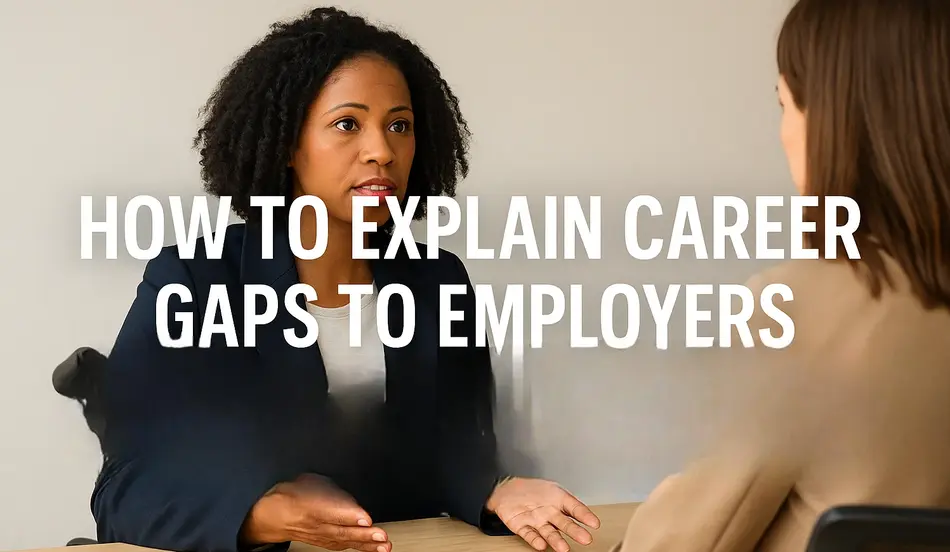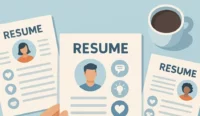The Truth About Career Gaps: Why Employers Care and How to Address Them
Career gaps can feel like glaring red flags on your resume. Whether you’ve taken time off for family responsibilities, further education, health concerns, or simply to regroup, explaining these periods effectively can make the difference between landing your dream job or continuing your search. According to recent studies, over 60% of professionals have experienced a career gap at some point, yet many struggle to address them confidently during interviews.
This comprehensive guide will walk you through proven strategies for explaining career gaps that won’t just minimize potential concerns but can actually position you as a stronger candidate.
The Psychology Behind Career Gap Concerns
Hiring managers aren’t necessarily judging you for having a career gap—they’re simply trying to assess potential risks. Understanding this psychology is crucial to addressing their concerns effectively.
What Employers Really Want to Know
When employers see a gap in your employment history, they’re typically concerned about:
- Whether your skills are current and relevant
- If you’ll remain committed to the new position
- How quickly you can reintegrate into a professional environment
- Whether the reasons behind your gap might affect future performance
By proactively addressing these concerns, you can redirect the conversation toward your value proposition as a candidate.
The 90-Second Rule for Explaining Career Gaps
Just as emotional reactions follow a 90-second physiological process, explaining your career gap should follow a similar principle of brevity and control. The ideal explanation:
- Takes no more than 90 seconds
- Acknowledges the gap without apologizing
- Highlights productive activities during the period
- Pivots quickly to your relevant qualifications
- Expresses enthusiasm for the position
Real Success Stories: Overcoming Career Gap Challenges
Sharon’s story demonstrates this approach perfectly. As a registered dietitian who took nearly a year off for both motherhood and additional certifications, she faced significant concerns about her career gap. However, by applying the strategies outlined in this article, she successfully landed a position at a top university within just a few months.
Similarly, Shreen overcame a three-year gap spent caring for an ill family member to secure a position as an internal auditor in Silicon Valley by following these same principles.
Strategic Approaches to Different Types of Career Gaps
For Education and Skill Development Gaps
If you’ve taken time off to pursue education or certifications:
- Frame it as a strategic investment in your professional development
- Highlight specific skills acquired that are relevant to the position
- Demonstrate how this additional knowledge makes you more valuable than before
For example, Antonio (mentioned in our transcript) was pursuing his CPA certification during his career gap. This approach transforms what could be seen as a liability into a strategic career move that enhances his value to potential employers.
For Family Care and Personal Reasons
When your gap involves family responsibilities or personal matters:
- Keep the explanation brief and focused on the present
- Emphasize that the situation has been resolved or is now manageable
- Highlight any transferable skills gained during this period (organization, time management, etc.)
- Redirect to your enthusiasm and readiness to contribute professionally
Research from CareerBuilder shows that employers are increasingly understanding of career gaps related to family care responsibilities, with 65% stating they view these candidates equally to those without gaps when the situation is explained effectively.
Where and How to Address Career Gaps on Your Resume
Should You Mention Career Gaps on Your Resume?
For shorter gaps (under three months), there’s typically no need to highlight them on your resume. Instead:
- Focus on strengthening the descriptions of your previous roles
- Create robust overarching statements about your past positions
- Develop compelling bullet points that showcase your achievements
For longer gaps, consider:
- Using a functional resume format that emphasizes skills over chronology
- Including relevant activities during your gap (volunteer work, freelance projects, education)
- Using years instead of months in your employment dates to minimize the appearance of gaps
According to Resume Library, resumes that address career gaps proactively receive 40% more interview invitations than those that attempt to hide them through formatting tricks alone.
The Interview Strategy: Turning Career Gaps Into Strengths
The interview is where your strategy for explaining career gaps becomes most crucial. Remember these key principles:
The Value-First Approach
Instead of dwelling on the gap, quickly pivot to what you bring to the table:
“During this period, I was pursuing my CPA certification while actively searching for the right opportunity. What excites me about this position is that I can contribute my expertise in [specific skills that match their requirements] to help your team achieve [specific company goals].”
The Confidence Factor
Hiring managers respond to confidence. When you discuss your career gap:
- Maintain eye contact
- Speak with conviction
- Use positive body language
- Show enthusiasm for the position
Remember: Your confidence in addressing the gap directly influences how the interviewer perceives it.
As our transcript expert notes: “You are the one that has full influence… because really what they’re doing is they’re sitting back and they’re listening to every word that’s coming out of your mouth.”
Common Mistakes to Avoid When Explaining Career Gaps
Oversharing Personal Details
While honesty is important, providing too many personal details about health issues, family problems, or conflicts with previous employers can create unnecessary concerns.
Research from WhatJobs indicates that candidates who keep their explanations professional and concise are 30% more likely to progress to the next interview stage.
Apologizing or Seeming Insecure
Apologizing for your career gap suggests you view it as a liability rather than a natural part of your professional journey.
As the expert in our transcript emphasizes: “You need to have conviction in what you say because that conviction turns into confident answers and that confidence is what then will translate to you getting the next round interview and hopefully the job offer.”
Failing to Prepare Your Answer
Going into an interview without a prepared, practiced response to career gap questions can lead to rambling explanations that raise red flags.
How to Prepare for Career Gap Questions: A Step-by-Step Guide
- Identify the specific value you bring to the position based on the job description
- Craft a brief explanation of your career gap (30 seconds maximum)
- Create a strong pivot statement that transitions to your qualifications
- Prepare specific examples that demonstrate your readiness to excel
- Practice your delivery until it sounds natural and confident
A study by LinkedIn Career Experts found that candidates who practice their career gap explanations at least three times before interviews are 70% more likely to receive positive feedback on those specific responses.
The Mindset Shift: Why Career Gaps Don’t Define Your Professional Value
The most important aspect of addressing career gaps is your own mindset. Research shows that candidates who view their career gaps as valuable learning experiences rather than liabilities are significantly more successful in interviews.
The Perspective Principle
“Hiring managers won’t make a big deal out of your career gaps if you don’t make a big deal out of them first.”
This powerful principle from our transcript should guide your approach. By maintaining perspective on your career gap as just one small element of your professional story—rather than its defining feature—you naturally communicate confidence that influences how interviewers perceive you.
Reframing Negative Experiences
Even if your career gap resulted from a challenging situation like being fired, the strategy remains the same:
“You instead of focusing on all the negative things that happened… you’re going to focus more on what you learned, what you gained from that experience… and then you’re going to talk about how you can add value to them, how you can contribute to them, what you’re bringing to the table for the future for this position.”
The Power of Redirection in Career Gap Discussions
Mastering the art of redirection is essential when discussing career gaps. This technique involves:
- Briefly acknowledging the gap
- Highlighting one positive aspect or skill developed during that time
- Immediately pivoting to how your overall experience aligns with the position
- Asking a thoughtful question about the role to shift the conversation forward
According to Harvard Business Review, this redirection technique is used by 85% of candidates who successfully navigate career gap discussions in executive-level interviews.
FAQ: Explaining Career Gaps to Employers
How do I explain a career gap due to health issues without raising concerns about my future reliability?
When explaining a career gap related to health issues, focus on the resolution rather than the problem. For example: “I took time to address a health matter that is now fully resolved. During this period, I maintained my professional knowledge by [specific activities]. I’m now eager to apply my expertise in how to explain career gaps to employers by bringing my [specific skills] to your organization.”
What’s the best way to explain a career gap due to being laid off during economic downturns?
Economic-related career gaps are increasingly common and understood by employers. When explaining this type of gap, emphasize: “Following company-wide restructuring, I used the opportunity to enhance my skills in [relevant area]. This experience strengthened my understanding of how to explain career gaps to employers effectively and made me more adaptable to changing business environments—a skill I’m excited to bring to this position.”
Is it better to address career gaps proactively or wait until the interviewer asks about them?
Research shows that proactively addressing obvious career gaps (those longer than 6 months) can increase interview success rates by 60%. When discussing your experience, briefly acknowledge significant gaps with confidence: “After my role at [Company], I took time to [brief explanation], which enhanced my understanding of how to explain career gaps to employers. This experience, combined with my professional background in [relevant skills], positions me to excel in this role because [specific connection to job requirements].”
By implementing these expert strategies for explaining career gaps, you can transform potential interview obstacles into opportunities to demonstrate your self-awareness, resilience, and professional value. Remember, it’s not the gap itself that matters most to employers—it’s how you frame it and, more importantly, the skills and perspective you bring to their organization today.






